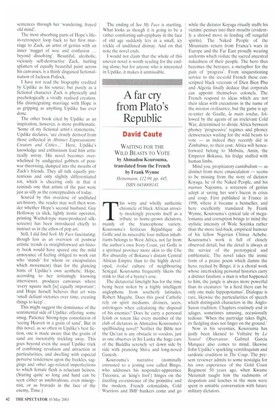A greed for particulars
Caroline Moore
SEEK MY FACE by John Updike Hamish Hamilton, £16.99, pp. 276, ISBN 0241141982 Francis Spufford, in his engaging account of childhood reading, The Child That Books Built, records his teenage pleasure in a particular line of pornography: The writing ... took exact almost obsessional note of different kinds of tissue ... I recognised this. It was another manifestation of the greed for particularities I had always
sought in stories.'
Few respectable writers satisfy our readerly greed for particularities (and, indeed, for closely observed types of tissue) quite so generously as John Updike. The sensuous incidental pleasures offered by his writing will always keep me reading: a used tea-bag sitting in the sink 'like a tiny-blackbrown handbag': a suckling baby 'clutching and unclutching one of her mother's fingers in a wrinkled palm that gripped as softly as a snapdragon'. I am, I must confess, a complete sucker for Updike's scatter-gun lyricism, headily mingling teabags and babies, sentimentality and repulsion.
In Seek My Face, however, such frozen moments serve to emphasise the novel's profoundly static, undramatic nature. Seek My Face takes the form of an interview between an ageing painter — 78-year-old Hope, whose chief claim to fame is that she has been married to two famous postwar artists — and Kathryn, an intrusive 27year-old journalist, the possessor of a repeatedly and obsessively noted nose:
Its curve ends in a tip where two small planes meet, the Lower facet continuous with the flesh of the septum, which extends lower than is common, so that her nostrils flare in profile, tender and avid and redly suffused with blood...
her hair 'hugely' sprawled on a pillow, as 'one a man could adore, go sick in love of, sink his seed into the groin of These are distinctly odd lucubrations for a 78-year-old female. And how many elderly hostesses accompany their younger female guests, in imagination, into the lavatory? A different kind of tissue intrudes in this context: 'The toilet down the hall flushes: Kathryn rising from the seat, having patted her oily dark cleft with a pad of tissue.'
I was about to claim that this undermines any illusion of a female narrator. However, a moment's reflection tells me that I will merely reveal the asexual paucity of my own imagination; for I realise that I have rarely, if ever, visualised even the most attractive of my own male guests using my lavatory.
Kathryn leaving the lavatory seat 'warm', and the onset of rain, are the actionhighlights of this novel. The ebb and flow of Hope's resentment of and desire to ingratiate herself with her interlocutor, which might provide a psychological narrative, ebbs and flows too often to hold our interest, though it may tell us something about Updike's own feelings about interviews. Yet at its layered best the novel interweaves the words spoken by Hope into Kathryn's tape-recorder with Hope's unspoken thoughts and vividly resurrected memories, 'looping' in long sentences through her 'wandering, frayed old mind'.
The most absorbing parts of Hope's lifein-retrospect loop back to her first marriage to Zack, an artist of genius with an inner 'nugget of woe and confusion ... beyond dissolving'. Beautiful, alcoholic, viciously self-destructive Zack, hurling splatters of equally beautiful paint across his canvasses, is a thinly disguised fictionalisation of Jackson Pollock.
I have not read the biography credited by Updike as his source; but purely as a fictional character Zack is physically and psychologically a vividly realised creation. His disintegrating marriage with Hope is as gripping as anything Updike has ever done.
The other book cited by Updike as an inspiration, however, is more problematic. 'Some of my fictional artist's statements,' Updike declares, 'are closely derived from those collected in Abstract Expressionism: Creators and Critics...' Here. Updike's knowledge and enthusiasm lead him artistically astray. His novel becomes overwhelmed by undigested gobbets of postwar theorising, dumped into the mouths of Zack's friends. They all talk equally pretentious and only slightly differentiated rot, which is cheering only in that it reminds one that artists of the past were just as silly as the conceptualists of today.
Soured by this overdose of undiluted art-history, the reader may well then wonder whether Hope's second husband, Guy Holloway (a slick, lightly ironic operator, printing Warhol-type mass-produced silkscreens) has been introduced chiefly to instruct us in the ethos of pop art.
Still, I did find Seek My Face fascinating: though less as an overview of postwar artistic trends (a straightforward art-history book would have spared one the mild annoyance of feeling obliged to work out who 'stands' for whom or encapsulates which movement) than for the glancing hints of Updike's own aesthetic, Hope, according to her irritatingly knowing interviewer, produces canvasses where 'every square inch [is] equally important'; and Hope herself believes that art wins 'small defiant victories over time, creating things to keep'.
This might suggest the dominance of the sentimental side of Updike: offering some smug, Patience Strong-type consolation of 'seeing Heaven in a grain of sand'. But in this novel, as so often in Updike's best fiction, one is made aware that the grains of sand are inexorably trickling away. This goes beyond even the usual Updike trick of combining revulsion and attraction in particularities, and dwelling with especial perverse tenderness upon the freckles, saggings and other age-related imperfections to which female flesh is reluctant heiress. (Staring quite so long and hard can be seen either as unchivalrous, even misogynist, or as bravado in the face of the enemy, Time.) The ending of See itty Face is startling. What looks as though it is going to be a rather comforting sub-epiphany in the face of old age suddenly lets in a small, icy trickle of undiluted dismay. And on that note the novel ends.
I would not claim that the whole of this uneven novel is worth reading for the ending alone; but for anyone who is interested in Updike, it makes it unmissable.



































































 Previous page
Previous page